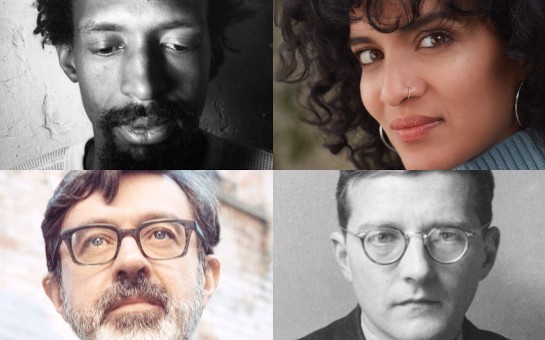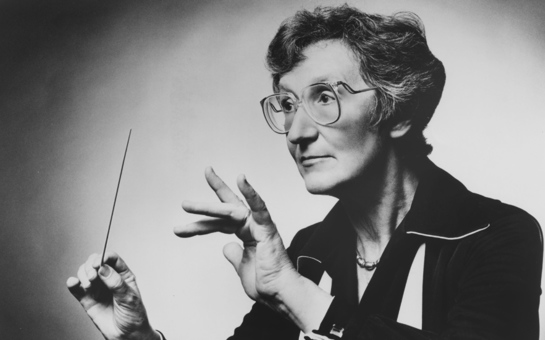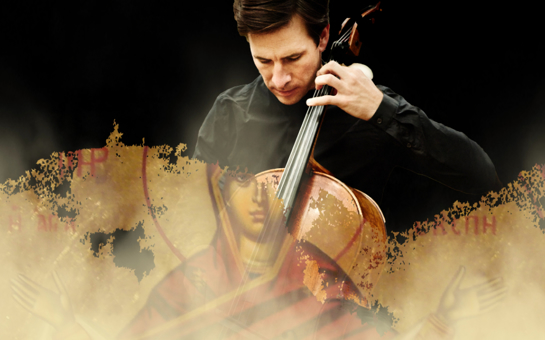No Neutral Position — Suffrage, Opera, and Women's History
8th March 2018

Susan B. Anthony, by Francis Benjamin Johnston (1900)
Susan B. Anthony, 1902
Ladies, there is no neutral position for us to assume.
Gertrude Stein, The Mother of Us All
Today — International Women's Day — is a time of recognition and celebration of the achievements of women worldwide. The voices and actions of women around the globe have become impossible to ignore in our current political climate. Each passing day newly refracts the historical changes brought on by women: young and old, famous or not, and of all different backgrounds. With that in mind, we turn our attention to operas that tell of remarkable women throughout time and place, whose lives left indelible marks, both profound and inconspicuous.
The year 2020 brings us to the 100th anniversary of women's suffrage in America. We invite you to celebrate this landmark change in American history with the pageant of The Mother of Us All, whose real and imagined characters center around the life and political ideals of Susan B. Anthony.
The Mother of Us All (1947; 1 hour, 44 minutes)
Virgil Thomson
Libretto: Gertrude Stein
Versions for full orchestra and chamber orchestra
Listen: The Mother of Us All
Peruse: Act I | Act II
Other Women Who Changed History and Changed the History of Opera
Grand Opera
The Gospel of Mary Magdalene (2013; 2 hours, 30 minutes)
Mark Adamo
Libretto: the composer
Drawing on the Gnostic gospels, the canonical gospels, and fifty years of New Testament scholarship, The Gospel of Mary Magdalene reimagines the New Testament through the eyes of its lone substantial female character. This opera imagines a version of Mary's vision at Jesus's tomb which — had it shaped the Christian story the way Peter's version of it did — might have left us a radically, radiantly different Western world.
Watch: San Francisco Opera highlights
Peruse: Act I, Vol 1 | Act I, Vol 2 | Act II | Libretto
Maria Paradis (1999; 1 hour, 30 minutes)
Bo Holten
Libretto: Eva Sommestad Holten
In Maria Paradis, an admired child-prodigy pianist toured Europe with her father, as did her contemporary, Mozart — but she was blind and no one knew why she lost her eyesight at four. Doctor Mesmer treats her with his ‘animal magnetism' and restores her vision, but she is disenchanted with the world that she now sees and has even lost her ability to play the piano. Maria's father accuses Mesmer of being a quack and the ensuing uproar leaves Maria blind again. Later on, when she performs in Paris as a grown woman, Mesmer turns up again.
Peruse: Full score
Frau Schindler (2016; three acts)
Thomas Morse
Libretto: by Kenneth Cazan with the composer
As an ordinary couple who became increasingly immersed in extraordinary circumstances, Emilie and Oskar Schindler found themselves faced with the ultimate moral decision. Told from Emilie Schindler's perspective, Frau Schindler examines how two living, breathing human beings who essentially endure the same daily wartime experiences can see them from two very different points of view. It is the story of a woman's survival and heroism in the heart of one of the darkest periods in human history.
Watch: Gärtnerplatztheater trailer
Peruse: Vocal score | Full score
Mary, Queen of Scots (1977; 2 hours, 12 minutes)
Thea Musgrave
Libretto: the composer, based on work by Amalia Elguera
Mary, Catholic Queen of Scotland and widowed Queen of France, has been invited by the Protestant Lords to return and assume the Scottish crown. Mary's personality is expressed through the different situations in which she finds herself in Mary, Queen of Scots — her marriage to Darnley; her stormy relationship with Bothwell; and her confrontation with her brother. In each she vies with the other to win the favor of the Lords of the Council and the allegiance of the people so as to have ultimate power and control. It is a struggle to the death.
Versions for full orchestra and chamber orchestra
Listen: Monologue of Mary
Madame Mao (2003; 2 hours)
Bright Sheng
Libretto: Colin Graham
As the corpse of Jiang Qing, or Madame Mao, swings in the cell where she has hanged herself, Madame Mao takes us retrospectively through the events of a life that came to this undignified end. Rejected by her father when she was a child, Jiang Qing sees a chance to prove herself when Mao Zedong, leader of the Communist Revolutionaries, throws his wife into an asylum and takes a fancy to her. As Mao's policies fail and he descends into a life of debauchery, Jiang Qing takes control, using the brutality of the Cultural Revolution to take revenge on those she feels have betrayed her.
Listen: please contact Peggy Monastra
Peruse: Act I | Act II
Mary of Egypt (1991; 1 hour, 40 minutes)
John Tavener
Libretto: Mother Thekla
Mary of Egypt is the story of the famous Egyptian prostitute-saint. As she sells herself on the streets of Alexandria, she comes across a group of young men embarking on a pilgrimage to Jerusalem and decides to join them. Meanwhile, in a monastery in Palestine, the arrogant holy man Zossima wonders why his good deeds and virtues have not brought him peace. Both Mary and Zossima separately hear a voice telling them to renounce everything and to go into the desert. After forty-seven solitary years in the desert, Mary and Zossima encounter each other for the first time and find in one another a sense of spiritual ecstasy.
Versions for full orchestra and chamber orchestra
Listen: Act III - Bless Duet
Peruse: Chamber version
Chamber Opera
Joan of Arc (1970; 30 minutes)
Geoffrey Burgon
Libretto: Susan Hill
Joan of Arc was found guilty of heresy and witchcraft in 1431. Today, her claim to hear voices sent by God would almost certainly be dismissed as mental disturbance, but in the fifteenth century, the power of her vision was enough to convince even the Dauphin that she was the savior of France. The music of Joan's voices permeates Joan of Arc and is derived from two pieces of plainchant, one for the Epiphany (the day of her birth) and the other for the Magnificat. Burgon also incorporated a well-known secular tune of her time, L'Homme armé.
The Hunger (2014; 1 hour, 10 minutes)
Donnacha Dennehy
Libretto: Asenath Nicholson, anon., + interviews with Noam Chomsky, Paul Krugman, Maureen Murphy, Branko Milan
The Hunger concerns itself with the Great Irish Famine of 1845-52, which transformed Irish society irrevocably. The main narrative in the piece is provided by the accounts of the famine by the American non-conformist Asenath Nicholson who spent two years traveling around Ireland helping those dying from starvation and writing about her experiences. Her account stands outside the norm because of her transgressive sympathy; she directly quotes from those suffering. Only the song, ‘Na Prátaí Dubha (Black Potatoes),' of the Sean-nós tradition deals with the topic. Shards of that song form the basis of an extended section sung by the Sean-nós singer.
Watch: Brooklyn Academy of Music: Making The Hunger
Peruse: Full score
Frida (1991; 2 hours)
Robert Xavier Rodríguez
Text: Book by Hilary Blecher. Lyrics and monologues by Migdalia Cruz.
Frida is the story of renowned Mexican artist Frida Kahlo, wife of the country's great muralist Diego Rivera. Diego's preoccupation with art and other women shrivel Frida's soul and her demands for love drain him; they need one another desperately. Divorce is imminent. Frida's health deteriorates; only painting permits emotional release, translating her agonies into a series of canvases. Her fate is to live alone, engulfed by pain, but her paintings live forever, reflecting hidden dreams and inspiring courage to transcend conventional boundaries.
Versions for chamber ensemble and for sextet
Watch: Act I - Death Dances 'round My Bed
Peruse: Vocal score | Full score Act I | Full score Act II
Monodrama
The Diary of Anne Frank (1968; 1 hour)
Grigori Frid
Libretto: Ulrike Patow
Anne's profound thoughts, her naive joy over a gift or a patch of blue sky, her fear and will to remain courageous, her budding love for Peter, her sense of situation comedy, and hope for freedom — all this finds expression in The Diary of Anne Frank. The libretto, taken from the original diary, is integrated into a musical-lyrical narrative, which shows both the tragedy of the events and the girl's poetic expressive power.
Watch: Scenes 15 and 16, Peter
Song from the Uproar: The Lives and Deaths of Isabelle Eberhardt (2012; 1 hour, 15 minutes)
Missy Mazzoli
Libretto: Royce Vavrek and the composer
Isabelle Eberhardt (1877-1904) was an explorer, nomad, journalist, novelist, passionate romantic, Sufi, and one of the most unique and unusual women of her era. At age twenty, after the death of her mother, brother, and father, she left her life in Switzerland for a nomadic and unfettered existence in the deserts of North Africa. She traveled extensively on horseback, often dressed as a man, relentlessly documenting her travels through detailed journals. At age twenty-seven Isabelle drowned in a flash flood. Song from the Uproar uses texts inspired by her writing to immerse the audience in the surreal landscapes of Isabelle's life.
Watch: Beth Morrison Project trailer
Peruse: Vocal score | Full score
Émilie (2008; 1 hour, 20 minutes)
Kaija Saariaho
Libretto: Amin Maalouf
Émilie du Châtelet is pregnant by her young lover, the poet Saint-Lambert, and soon to go into labor. She writes him a letter full of reflections and premonitions. It is one day since she finished her translation of Newton's Philosophiae Naturalis Principia Mathematica, four days before she will give birth to her daughter, and nine days before she herself will die. She thinks not only of the nights of passion with Saint-Lambert and with Voltaire, her great love, but also of the end of their love and of death. Émilie asks us: How will she be remembered?
Watch: Finnish National Opera trailer
Peruse: Vocal score | Full score




